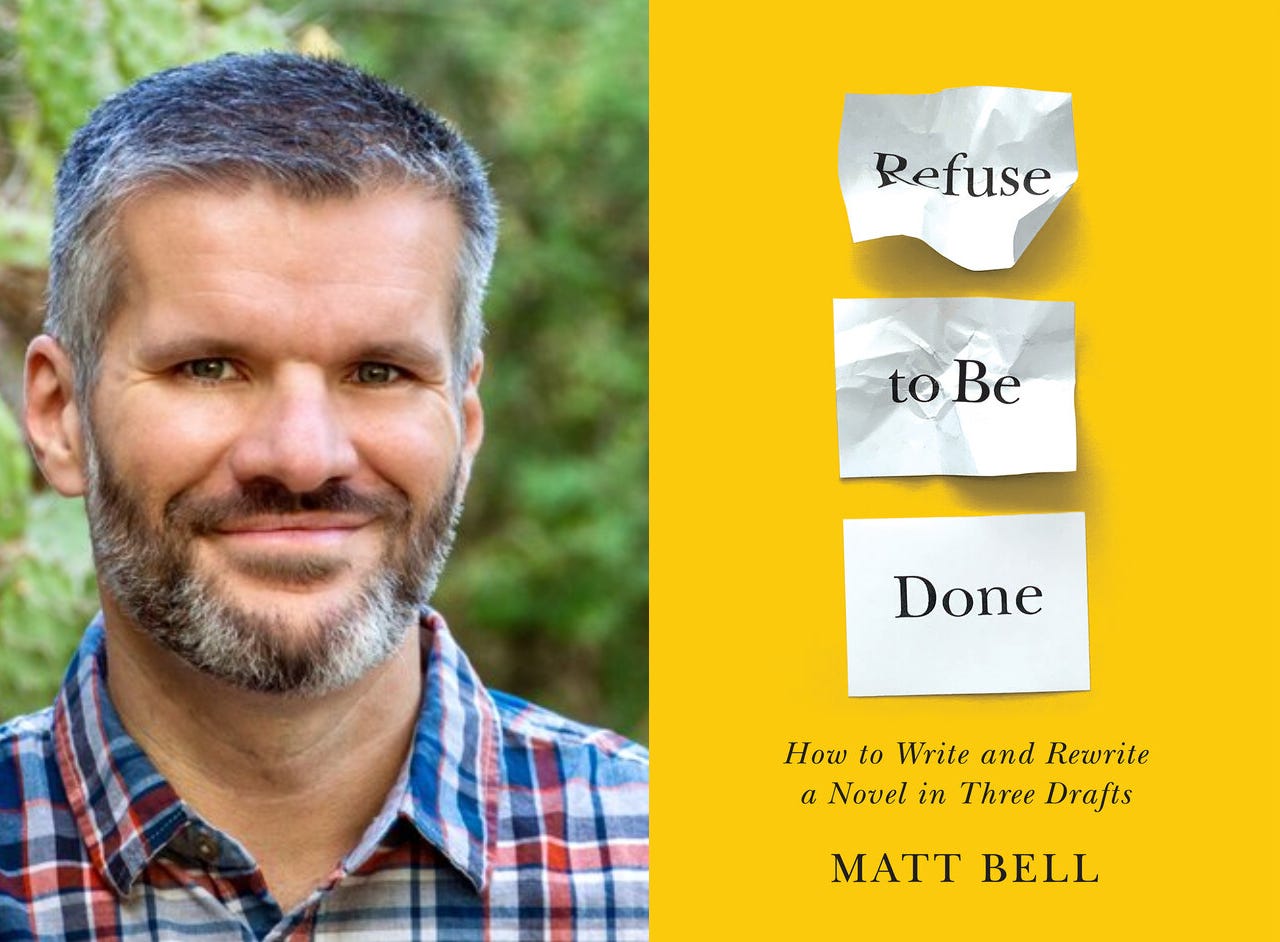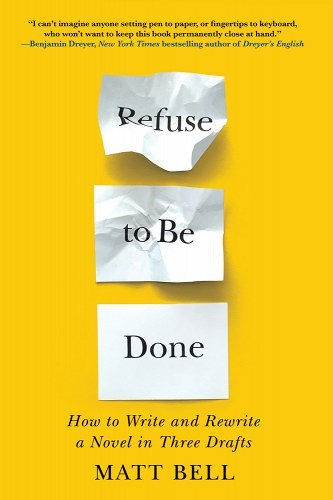Processing: How Matt Bell Wrote Refuse to Be Done
The author on revision, genre, and his new craft book
I’m often wary of craft books. Many seem to fall into two camps: overly vague and offering more mysticism than practical advice, or else so specific they impose one writer’s individual aesthetic and personal process on all of literature. I’m happy to say that Matt Bell’s new craft book, Refuse to Be Done, is neither of these things. Bell’s book—which is coming out tomorrow and can be pre-ordered here—offers a huge range of advice from pep talks to broad strokes guidelines to usefully specific advice (such as a list of “weasel words” to search your document for). This cornucopia is bolstered by a wide range of examples from literature and quotes from author interviews from across genres and literary history. Bell presents his eclectic mix of tips and tricks in bite-sized form and with an open, non-ideological POV. “This book is here to serve you and your book,” he writes in the introduction. “Only what’s useful applies.
Bell’s approach to craft is similar to my own and I’ve long admired his ability to move between genres and forms in his fiction as well as his own excellent Substack that provides monthly writing exercises alongside explanations and craft thoughts. So I thought Bell would be the perfect second entry in the “processing” series in which I ask authors about the process of writing their books. (The first entry in this series was Calvin Kasulke and Several People Are Typing if you missed it.)
Our interview is below, and if you’re stuck on a writing project or just want a whole bunch of excellent tips consider checking out Refuse to Be Done.
Refuse to Be Done presents a huge and thrilling variety of tactics for writing and revising fiction that are presented in a bite-sized chunks one after another. Here are some subheadings from the first draft section: “Steer Toward the Rapids,” “Yes, And,” “Revisit Your Settings,” “Vary Tone and Texture.” I imagine a reader could flip through to a random page and find an idea to steal for their draft. It reminded me of a video game inventory, where the warrior (writer) can flip through and pick the right weapon when stuck. Or to use a more highbrow reference, like a more practical version and detailed version of Brian Eno’s Oblique Strategies.
My question is how you came up with the structure of this book? Did you always know it would be presented in these short chunks and separated between first draft, second draft, and third draft?
Refuse to Be Done began as a craft talk on revision and rewriting, given first in a class of mine and then made into something standalone that I could teach at writing conferences and low-res residencies and so on. Its initial structure was a bit more grab bag—"here's what I know about revising fiction"—but at some point I gave a version of it specifically for a novel-writing workshop, and that led to the earliest version of the "three drafts." They're more delineated in the book than they ever were in the talk version, but I do think it's been a useful way of imagining the novel-writing process, even if many of the tactics I've put under one "draft" might be just as useful in another.
Speaking of a variety of approaches, as someone who has published several novels (and story collections) that cover a range of genres and styles I’m very curious about how much your own process changed book to book. How different was the process of writing the speculative fiction epic Appleseed differ from a more real-world novel like Scrapper?
I don't think the genre made a ton of difference in a technical way, although I think the heavy research I did for Scrapper likely prepared me to do it in Appleseed. (My first novel was much less research-intensive than either of those two.) The biggest difference between Scrapper and Appleseed was the increased scale and the triple storyline of the latter: Scrapper barely even has a B-plot, much less three braided threads, each of which is novel-length on its own. So I had to figure out how to put all that together, which did require me to develop some new skills.
Another thing that changed between the two books was my approach to scene and dialogue. Dialogue was always a weak spot in my fiction, and one of my goals in Appleseed was to get better at it and to use it to drive more scenes, instead of working around it. I do think that happened, thankfully, and it's been nice to start the book I'm writing now with those skills already in place.
Is there anything about your fiction writing process that has stayed the same from book to book? Some things you always do?
I talk in Refuse to Be Done about my process of writing an exploratory first draft, then outlining that draft to plan a second, which I then rewrite more or less from scratch. That's been the process every time so far—I'm in the middle of that second draft process again, right now—and I don't see it changing anytime soon. The second drafts I write in this way are simply so much better than their first drafts that I'm not sure I'd trust myself to skip it.
I saw you tweet that you’ve never found Scrivener useful… until you wrote Refuse to Be Done. What about the program worked better for you with nonfiction than fiction?
For Refuse to Be Done, I outlined the book in Scrivener, then simply filled out the outline inside the program. As I wrote, better orders and organizations sometimes became obvious—maybe this piece of advice was better off in the second draft chapter, for instance—and Scrivener made it easy to move the pieces around. But for a novel, that's never been that useful: even my second draft outlines don't produce such a 1:1 document, and it's very rarely true that I can simply pick up a chunk of novel draft and move it to a new location without a lot of rewriting.
Once I had a draft in Scrivener for Refuse to Be Done, I did transfer it to Word and edit there. For better or worse, that's still the best program for me to work with a full manuscript in, probably because of muscle/brain memory as much as anything else.
As a professor, I sometimes recommend methods that work really well for my students but have never worked for me. I’ve never gotten anything out of the “vomit up a draft and edit later” method, yet I know many professional writers who use it. Are there any techniques you write about in Refuse to Be Done that just haven’t ever worked for your own writing?
I don't think there's anything in Refuse to Be Done that has never worked for me, but there are certainly things that come easier to me than others, and other tactics that aren't as natural. I mentioned dialogue earlier as a place I struggle sometimes: I think the dialogue section in my book is a pretty clear description of several ways to make dialogue interesting, but you'll notice it's in the Second Draft chapter, not the first. I can almost never hold all those tactics in my head the first time I write a conversation.
You seem to be a writer who is always working on multiple projects between nonfiction, stories, poems, and novels. How do you juggle those things? Do you set aside specific days or months for specific projects? Just work on what inspires you that day? Something else?
I actually think I'm the opposite of what you think! I have a one-track mind, more often than not, which makes switching projects difficult. I've been finishing a short story, for instance, which feels like it's cost me a wild amount of novel drafting time. The only thing I purposely silo is business work: when I was submitting stories or querying agents, for instance, I learned to only let myself do it one day a week so that the cost to my brainspace could be as confined as possible. Similarly, I try to write every day before I begin my teaching work or other professional duties, so that the two things aren't competing for my attention.
One thing I admire about your writing is that you always seem to want to push yourself to do something new. Write in a new genre. Try a new form. A flash fiction collection one day, an epic novel the next. I get the impression the challenge of a new form or genre excites and motivates you, which is true for me too. What are some forms or genres you haven’t written yet that you want to try?
I think my purest career goal is to write at least one book in every genre I love. I'd also love to eventually write for other mediums, maybe especially video games or television, both of which seem different enough (especially in their collaborative elements) to really require a new skillset. But every new book is a chance to learn something how to do something new, and I always look forward to finding out what that something new might be.
Refuse to Be Done will be on sale March 7th. Follow Matt Bell on Substack here and Twitter here.
If you like this newsletter, please consider subscribing or checking out my recently released science fiction novel The Body Scout, which The New York Times called “Timeless and original…a wild ride, sad and funny, surreal and intelligent” and Boing Boing declared “a modern cyberpunk masterpiece.”





I've been using Bell's book to edit the novel I'm working on. Lots of helpful stuff!